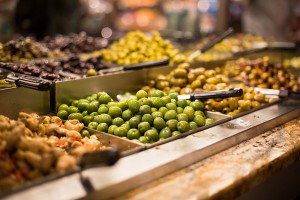 A specialty grocery store carries products that are marketed to specific dietary niches. What you carry in your store is not like the groceries carried in your everyday grocery stores, and you need a POS system to fit this. Here are four features your specialty grocery POS should have in order for your business to run smoothly.
A specialty grocery store carries products that are marketed to specific dietary niches. What you carry in your store is not like the groceries carried in your everyday grocery stores, and you need a POS system to fit this. Here are four features your specialty grocery POS should have in order for your business to run smoothly.
1. Scale and Scanner Integration
Specialty grocery stores often offer bulk items that are sold by weight rather than prepackaged and pre-weighed items. For this reason, you would want a specialty grocery POS interface and scale that is NTEP Certified . This means your POS should be capable of reading weight embedded barcodes, displaying weight on-screen from the scale, and obtaining exact measurements in order to speed up transaction times and reduce shrinkage. Your specialty grocery POS should also allow you to assign a Tare to any PLU so you can have specific package weights that correspond to different sizes and types of containers the customer puts their bulk items in. Ultimately, all of this will save you money by reducing shrink, save your cashiers’ time when checking out customers, and offer your customers the convenience of not having to weigh items themselves.
2. Inventory Control
Keeping accurate inventory at a specialty grocery store is important. Usually your products come from smaller wholesalers than a larger supermarket would deal with. Thus, ordering products is more expensive and there is less room for error when it comes to your inventory. Your specialty grocery POS can keep track of your items for you, subtracting from the count by each sale. It can even keep track of your bulk items, which are difficult to keep inventory on because they are sold by weight. Using the weights from each weighed sale, the specialty grocery POS can subtract from your bulk items’ original weights. You can keep track of which items are getting low without taking a hands-on approach, and the POS can even place reorders automatically so you never run out of a product.
3. Cloud POS Reporting
Gathering data about your business from anywhere and at any time is important to stay on top of things. Having a specialty grocery POS that allows you to run reports on sales, inventory, labor costs, and other business-related expenses remotely is important. Through a cloud system, you can access your store’s business information from home, on your mobile device, or as you normally would from a back office computer.
4. Loyalty Programs
Winning customers is important, but keeping them is essential to the health of your business. For this reason, your specialty grocery POS should have the ability to interface with loyalty software for reporting and marketing purposes. This is critical, as providing your customers with an incentive to stay loyal, ensures they keep coming back to you and not to your competitors.
Loyalty software can provide customers with incentive in a number of different ways, including rewards cards, coupons, and loyalty points based upon each individual customer’s purchase history. Programs like these will undoubtedly provide a generous return on investment as you begin to see each of your customers come back for more.
Specialty grocery POS can help you manage your grocery store with ease. Keep these four features in mind when optimizing your store’s POS. It will save you loads of time and headaches.






